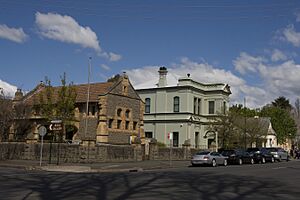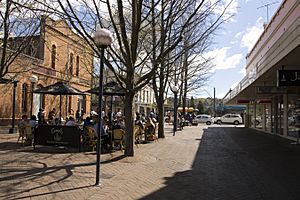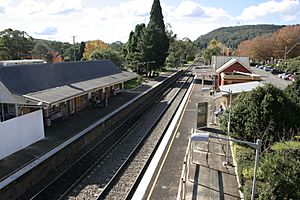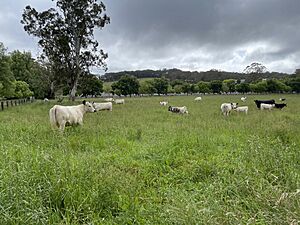Bowral facts for kids
Quick facts for kids BowralNew South Wales |
|||||||||||||||
|---|---|---|---|---|---|---|---|---|---|---|---|---|---|---|---|
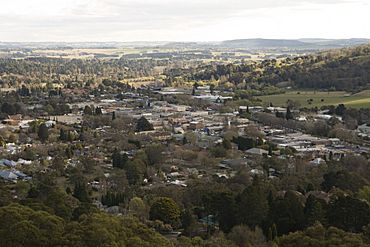
Aerial view of Bowral
|
|||||||||||||||
| Established | 1861 | ||||||||||||||
| Postcode(s) | 2576 | ||||||||||||||
| Elevation | 690 m (2,264 ft) | ||||||||||||||
| Location |
|
||||||||||||||
| LGA(s) | Wingecarribee Shire | ||||||||||||||
| Region | Southern Highlands | ||||||||||||||
| County | Camden | ||||||||||||||
| Parish | Mittagong | ||||||||||||||
| State electorate(s) | Wollondilly | ||||||||||||||
| Federal Division(s) | Whitlam | ||||||||||||||
|
|||||||||||||||
|
|||||||||||||||
Bowral (/ˈbaʊrəl/) is the biggest town in the Southern Highlands of New South Wales, Australia. It's about a ninety-minute drive southwest of Sydney. Bowral is the main shopping and fun area for the Wingecarribee Shire and the Highlands region.
Long ago, rich people from Sydney used Bowral as a summer getaway. This led to many large homes and estates being built here. Bowral is also famous for its connection to the legendary cricket player, Sir Donald Bradman.
Bowral is close to other old towns. It's only 5 km (3 miles) from Mittagong. It's also 9 km (5.6 miles) from both Moss Vale and Berrima. Nearby areas include East Bowral and Burradoo.
Contents
History of Bowral
Bowral's history with European settlers goes back about 200 years. Before that, the land was home to the Tharawal (or Dharawal) Aboriginal tribe. The first European to explore this area was John Wilson, sent by Governor Hunter.
Later, famous explorers like John Oxley and Charles Throsby also passed through. Governor Lachlan Macquarie gave 2,400 acres (9.7 km²) of land to John Oxley. This land later became the town of Bowral.
The town grew quickly between the 1860s and 1890s. This was mainly because a railway line was built from Sydney to Melbourne. In 1863, a stone church was built, which was later replaced by the first Anglican church, St Simon and St Jude.
This church was designed by Edmund Blacket and built in 1874. It was made bigger in 1887 as more people moved to Bowral. Today, only Blacket's belltower is still standing. One of the first large houses built as a mountain retreat was Craigieburn in 1885.
Gardens and European plants started to grow well from 1887. People in Bowral began planting deciduous trees to make the area look like Europe or the British countryside. This tradition continues today. The oak trees at the start of Bong Bong Street are special. They give Bowral beautiful autumn colours and make it different from other country towns.
Bowral became a wealthy town. Many rich people from Sydney bought land or property here. They built grand Victorian style homes.
Heritage Buildings
Bowral has several places that are listed as heritage sites. This means they are important historical buildings or areas.
- Evans Lane: Kurkulla
- Glebe Street: Bradman Oval
- Oxley Drive: Mount Gibraltar Trachyte Quarries Complex
What Does "Bowral" Mean?
The name Bowral, and its older spelling Bowrall, might come from a Dharawal word. The word bowrel means "high".
People of Bowral
The latest count in 2021 showed that Bowral's population was 10,764 people.
In 2021, most people (73.5%) in Bowral were born in Australia. The next biggest groups were from England (7.1%) and New Zealand (1.8%). Most people (88.0%) spoke only English at home. About 1.0% of Bowral's population were Aboriginal and Torres Strait Islander people.
In recent years, Bowral has become a popular place for retirees and "empty nesters." These are often older people from Sydney whose children have grown up and moved out. About 35.5% of Bowral's population is over 64 years old. This is much higher than the national average. Because of this, Bowral has many retirement villages.
Getting Around Bowral
Bowral is about 5 km (3 miles) from the Hume Highway. This highway goes north to Sydney and south to Canberra and Melbourne. In the past, Bowral was a common place for travellers to stop overnight.
The Bowral railway station has train services. These trains run on the Southern Highlands Line between Sydney and places like Moss Vale or Goulburn. There are also longer distance services to Canberra.
Public buses also run from Bowral to nearby towns like Nowra and Wollongong. A private bus company also offers services to parts of Sydney and the south coast.
Bowral's Weather
Bowral has an oceanic climate (Cfb). This means it has warm to mild, rainy summers. Winters are quite cool to cold with some sunshine. Frost is common in winter and can even happen in summer. Snow is rare, but sometimes more than 15 cm (6 inches) has fallen. The hottest day recorded was 40.0°C (104.0°F) in January 2003. The coldest was -11.2°C (11.8°F) in July 1971.
| Climate data for Bowral (Parry Drive, 1961–2015); 690 m AMSL; 34.49° S, 150.40° E | |||||||||||||
|---|---|---|---|---|---|---|---|---|---|---|---|---|---|
| Month | Jan | Feb | Mar | Apr | May | Jun | Jul | Aug | Sep | Oct | Nov | Dec | Year |
| Record high °C (°F) | 40.0 (104.0) |
39.1 (102.4) |
35.7 (96.3) |
31.5 (88.7) |
25.5 (77.9) |
20.1 (68.2) |
20.3 (68.5) |
23.8 (74.8) |
29.1 (84.4) |
32.4 (90.3) |
38.3 (100.9) |
37.2 (99.0) |
40.0 (104.0) |
| Mean daily maximum °C (°F) | 25.5 (77.9) |
24.4 (75.9) |
22.4 (72.3) |
19.3 (66.7) |
15.4 (59.7) |
12.4 (54.3) |
11.6 (52.9) |
13.4 (56.1) |
16.3 (61.3) |
19.0 (66.2) |
21.4 (70.5) |
23.8 (74.8) |
18.7 (65.7) |
| Mean daily minimum °C (°F) | 13.4 (56.1) |
13.5 (56.3) |
11.6 (52.9) |
8.2 (46.8) |
5.3 (41.5) |
3.5 (38.3) |
2.1 (35.8) |
3.1 (37.6) |
5.3 (41.5) |
7.7 (45.9) |
9.8 (49.6) |
11.6 (52.9) |
7.9 (46.3) |
| Record low °C (°F) | 2.1 (35.8) |
1.8 (35.2) |
−0.7 (30.7) |
−2.2 (28.0) |
−6.3 (20.7) |
−8.2 (17.2) |
−11.2 (11.8) |
−6.1 (21.0) |
−5.7 (21.7) |
−2.6 (27.3) |
−2.2 (28.0) |
−1.4 (29.5) |
−11.2 (11.8) |
| Average precipitation mm (inches) | 81.9 (3.22) |
98.4 (3.87) |
95.2 (3.75) |
75.8 (2.98) |
69.6 (2.74) |
84.0 (3.31) |
45.3 (1.78) |
61.6 (2.43) |
55.8 (2.20) |
71.6 (2.82) |
92.4 (3.64) |
78.6 (3.09) |
931.7 (36.68) |
| Average precipitation days | 13.5 | 13.4 | 13.3 | 11.1 | 11.2 | 11.2 | 9.9 | 9.6 | 10.2 | 11.6 | 13.5 | 12.6 | 141.1 |
| Average afternoon relative humidity (%) | 57 | 64 | 61 | 61 | 65 | 67 | 64 | 56 | 54 | 56 | 60 | 56 | 60 |
Fun Things to Do in Bowral
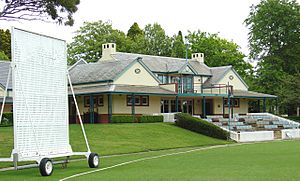
Bowral is known for its unique shops, antique stores, and nice restaurants and cafes.
The Bradman Oval, Bradman Museum, and International Cricket Hall of Fame are all about the amazing cricketer Sir Donald Bradman and the game of cricket. It's a must-see for sports fans!
The Cecil Hoskins Nature Reserve is a great place for picnics and watching birds. It's located in the south of the town.
Bowral hosts "Tulip Time" every spring at Corbett Gardens. It's a big celebration with lots of colourful tulips and other flowers planted in the town centre. There's also a special private botanic garden with many different types of plants.
The town has a Vietnam War Memorial and Cherry Tree Walk. This walking path runs along the Mittagong Rivulet. There are 526 cherry trees planted, each honouring a soldier who died serving their country.
Bowral and the area around it were named a "book town" in 2000. This means it has many bookshops and connections to famous writers. These include P. L. Travers, who wrote the Mary Poppins books.
Since 2016, Bowral has hosted "The Bowral Classic" every spring. This popular cycling event brings hundreds of riders to compete in races of different lengths.
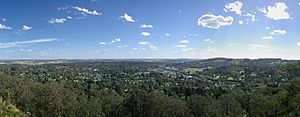
The Bong Bong Picnic Races started in 1886. These horse races used to attract huge crowds. After a break, they started again in 1992 as a special event for members. Now, about 5,000 people attend each November.
Bowral also has some vineyards where grapes are grown for wine. It's close to Mittagong, which is the centre for wineries in the Southern Highlands. There are 60 vineyards in this cool-climate wine region.
Bowral is overlooked by Mount Gibraltar, which is 863 metres (2,831 ft) high. From its lookouts, you can see amazing views of Bowral, Mittagong, Moss Vale, and the ranges near Bundanoon.
Hospitals in Bowral
The town has the Bowral and District Hospital. This hospital serves the whole Southern Highlands region. It was started in 1889.
Bowral also has a private hospital run by Ramsay Health Care. It has places for people to stay for short or long periods. However, it does not have an emergency room.
Schools in Bowral
Here are some of the schools in Bowral:
- Bowral High School
- Bowral Public School
- Chevalier College (Burradoo)
- Oxley College (Burradoo)
- Southern Highlands Christian School (East Bowral)
- St Thomas Aquinas Catholic Primary School
Churches in Bowral
Here are some of the churches in Bowral:
- The Fields Church
- St Simon's and St Jude's Anglican Church
- St Thomas Aquinas Roman Catholic Church
- St Andrew's Presbyterian Church
- Bowral Uniting Church
- Bowral First Church of Christ, Scientist
- Bowral Baptist Church
- Bowral Salvation Army
- Bowral Church of Christ
- Seventh-day Adventist Church
Media in Bowral
Television
Bowral gets five free TV stations. These include two government-funded networks:
- The ABC
- The SBS
And three commercial networks:
- Seven
- Nine
- Southern Cross 10
All these networks also offer extra channels like 7two, 7mate, 9Go!, ABC TV Plus, SBS Viceland, and 10 Bold.
Radio
Radio stations you can listen to in Bowral are:
- Highland FM (107.1 FM)
- VOX FM (106.9 FM)
- Wave FM (96.5 FM)
- ABC Illawarra (97.3 FM)
- Triple J (98.9 FM)
- Radio National (1431 AM)
- ABC Classic FM (95.7 FM)
- Newsradio (90.9 FM)
Newspapers
The local weekly newspaper for Bowral is called the Southern Highland News.
Famous People from Bowral
Many interesting people have lived in Bowral:
- Sir Edmund Barton: Australia's very first Prime Minister.
- Sir Donald Bradman: A legendary Australian cricketer. Bowral's welcome sign even shows him ready to bat!
- Ita Buttrose: A well-known journalist and businesswoman.
- Jennifer Byrne: A journalist and former book publisher.
- Richard Carleton: A famous TV reporter. He was born in Bowral.
- Lauren Cheatle: A fast bowler for the Australian women's cricket team. She lives in Bowral.
- Bryce Courtenay: A popular novelist.
- Andrew Denton: A TV producer and comedian.
- Lorrae Desmond: An actress from the show A Country Practice.
- John Fahey: A former Premier of New South Wales.
- Peter Garrett: A former government minister and singer from the band Midnight Oil.
- Nathan Hindmarsh: A famous rugby league player.
- Geoff Jansz: A television chef.
- Graham Kennedy: Known as "The King" of Australian television.
- P. L. Travers: The author who wrote the Mary Poppins books.
- Arthur Upfield: An author known for his "Boney" detective novels.
- Tim the Yowie Man: A cryptonaturalist and author who lived in Bowral.
 | Calvin Brent |
 | Walter T. Bailey |
 | Martha Cassell Thompson |
 | Alberta Jeannette Cassell |



